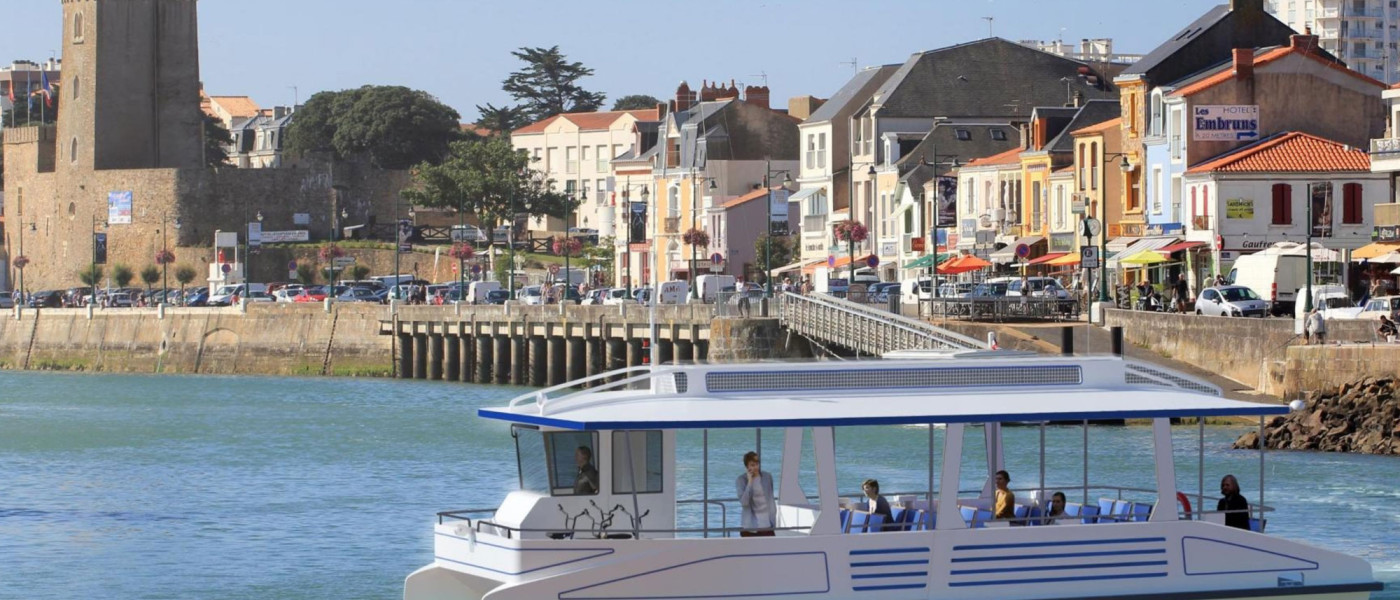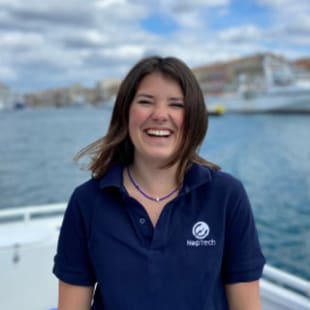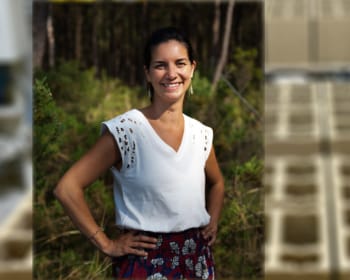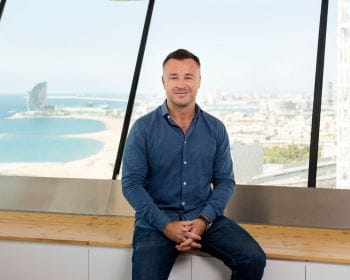How did NepTech come into being ?
Tanguy Goetz: NepTech is a maritime innovation laboratory that we founded in 2020, with my two partners, Corentin Bigot and Clément Rousset. The three of us had combined experience of 35 years in architecture and naval and aeronautical engineering as well as the shared conviction that the energy transition requires the maritime sector to reinvent itself. We therefore decided to develop a low-carbon urban mobility offer for local authorities and tourist operators which allows them to make the best use of waterways. And this is what we are designing today: maritime and river transport shuttles with carbon-free propulsion.
Lenna Gwiss: Urban transport is a major contributor to greenhouse gas emissions and pollution, which has a negative impact on air quality and the lives of local residents. As many cities have historically been located on the coast or on waterways, the opportunities for developing alternative transport services now need to be exploited more extensively. This is one of the reasons why we chose to gain footholds in southern France with cities like Toulon, Marseille, Monaco and Nice providing an ideal setting.
Can you tell us more about these “shuttles”? Who are they intended for?
Tanguy Goetz: We’re talking about small catamarans 10 to 30 metres long, depending on the configuration, equipped with different propulsion systems: fully electric with battery, electro-hydrogen or diesel-electric hybrid. These shuttles allow the transport of people (up to 250 passengers) as well as goods on the penultimate mile (capacity of 20 tonnes). Thanks to our chassis, which features the innovations we’ve developed, all our models achieve a significant reduction in their energy consumption compared to a standard vessel. Our innovations save up to 35% energy. This allows fewer batteries to be carried on board, providing operators with efficient vessels at the best possible cost.
Lenna Gwiss: Our passenger transport offer responds to the environmental and urban congestion challenges facing many local authorities. It is all about green and soft mobility, which respects the marine ecosystem and meets the criteria of Low Emission Zones (LEZ) while offering a quality experience: almost silent, odourless transport without vibrations. The use of waterways also frees up congested roads in urban areas and tourist coastal zones. Users of NepTech river and sea shuttles can look forward to pleasant, responsible journeys without traffic jams. As for goods, our offer is aimed at professionals working in urban areas who are keen to decarbonize their supply chain.
This is the contribution of the maritime sector to global greenhouse gas emissions*.
A constantly increasing carbon footprint, because this sector constitutes the backbone of the global economy: it provides 80% of the transport volume of commercial goods**. The decarbonization of the sector is therefore an important and global issue.
Sources :
* European Commission
Can you tell us how you came to team up with BNP Paribas?
Tanguy Goetz: As soon as we moved to Aix-en-Provence in May 2020, we were contacted by Stephan Antaramian, Business Developer Innovation at the Maritime Division of BNP Paribas’ Banque Commerciale in France. He offered to help us develop within the framework of the Marseille WAI hub. This turned out to be the ideal support - a banking partner that is fully aware of the challenges faced by an innovative start-up such as ours and is able to understand our needs and translate them into concrete solutions.
Lenna Gwiss: We benefit from the fact that BNP Paribas is fully integrated into the region’s ecosystem, with competitiveness clusters as well as incubators and investors. The Group also regularly invites us to support it during national and international events, such as VivaTech in Paris. Although Neptech has established itself as one of the French maritime startups to watch, we operate in a market of small players. Being supported by a group like BNP Paribas on such a strategic issue offers us a fantastic competitive advantage.
"Since we met with NepTech in 2020, the company has moved from technical drawings to the delivery of innovative carbon-free vessels. Their model predisposes them to grow and export. We will have the tools to support them there too. They provide a perfect illustration of the major role played by small, agile structures in terms of innovation in the maritime sector, where BNP Paribas also supports the biggest players. This partnership with NepTech represents the opportunity to deploy their innovations on a larger scale to benefit all our stakeholders."
Could you update us on your latest achievements and projects?
Tanguy Goetz: This year, we celebrated our first launch: it concerns a fully electric tourist shuttle, with a capacity of 70 passengers, which navigates the canals of Sète. Two electric shuttles are being built, with a capacity of 50 passengers each, which will be used for harbour navigation in Les Sables d’Olonne. We also have a hybrid scientific boat under construction which will be operated by the National Research Institute for Agriculture, Food and the Environment (INRAe) for its studies on Lake Geneva.
The Maritime Division of BNP Paribas
The Maritime Division of BNP PARIBAS in France is a maritime expertise centre dedicated to the Bank’s clients and prospects working in all sectors of maritime activity and especially the energy transition of transport and respect for marine biodiversity. It is led by Christèle Gauthier: “In this specialized and promising world that is the Blue Economy, the joint intervention of the WAI hub and the Maritime Division is the kind of winning combination that makes it possible to gain and retain customer trust.”
What are your goals and development prospects for the future?
Lenna Gwiss: We are seeing an increasing number of calls for tenders for river, coastal and port services in France and beyond, and these issues are being considered in many European countries such as Italy and Spain. We are perfectly placed to respond and are preparing for internationalisation.
Tanguy Goetz: We are convinced that technological developments in carbon-free propulsion are expected by institutions and local authorities as well as professionals and users. So we are on the right course!
Learn more about NepTech
Created in 2020, NepTech is a maritime innovation laboratory which designs and markets boats used as a mode of transport, maritime or river buses and for the transport of goods. Its offer of shuttles with carbon-free propulsion, fully electric, electro-hydrogen or diesel-electric hybrid, helps meet the strategic challenges of decarbonization of the maritime sector which must achieve carbon neutrality by 2050.
- In 2023, NepTech raised €1.5 million in funds, including €800,000 of private financing.
- In 2024, the first NepTech design shuttle was launched in Sète. Three others are under construction with a launch planned for late summer.







